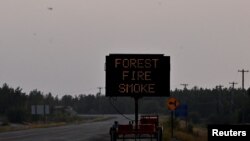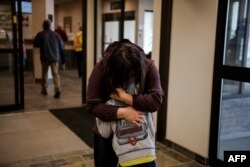Residents heeded warnings to evacuate the capital of Canada's Northwest Territories as a large wildfire burned just miles outside the city of 20,000 Friday, while firefighters in battled a growing fire that set homes ablaze in a city in British Columbia.
Thousands of people in Yellowknife drove hundreds of kilometers to safety, with authorities guiding motorists through fire zones, while others waited in long lines for emergency flights as the worst fire season on record in Canada showed no signs of easing.
Air tankers flew missions to keep the only route out of Yellowknife open. Meanwhile, a network of fire guards, sprinklers and water cannons was established to try to protect the city from the fire.
Fire Information Officer Mike Westwick told The Associated Press by phone Friday evening that the fire did not advance Friday and was still 15 kilometers (9 miles) northwest of the city, partly because cooler temperatures created less fire activity and cleared some smoke, allowing air tankers to safely fly and drop fire retardant.
Even so, "we've got the wrong kind of wind" in the forecast — gusty and from the west and northwest — and no rain, Westwick warned.
The fire, caused by lightning more than a month ago, is about 1,670 square kilometers (644 square miles) and "not going away anytime soon," he said, adding that the blaze has jumped three different containment lines, fueled by dry weather and dense forests.
"We've still got some really difficult days ahead. There's no denying that," Westwick said earlier Friday.
Gas stations that still had fuel were open Friday, though the city was virtually empty, with one grocery store, a pharmacy and a bar still open.
"It's kind of like having a pint at the end of the world," said Kieron Testart, who went door-to-door in the nearby First Nation communities of Dettah and NDilo to check on people. Indigenous communities have been hit hard by the wildfires, which threaten important cultural activities such as hunting, fishing and gathering native plants.
Hundreds of kilometers south of Yellowknife, homes were burning in West Kelowna, British Columbia, a city of about 38,000, after a wildfire grew "exponentially worse" than expected overnight, the fire chief said.
Residents had already been ordered to evacuate 2,400 properties, while an additional 4,800 properties were on evacuation alert. The BC Wildfire Service said the fire grew six times larger overnight and it stretched over 68 square kilometers (26 square miles).
Some first responders became trapped while rescuing people who failed to evacuate, said Jason Brolund, chief of the West Kelowna fire department, who said residents face another "scary night." There was no known loss of life.
"There were a number of risks taken to save lives and property last night," Brolund said at a news conference, describing how first responders had to rescue people who jumped into a lake to avoid the flames. "It didn't have to be that way."
Bowinn Ma, the province's minister of emergency management, said at a news briefing Friday afternoon that "we are still faced with great challenges."
"I was deeply horrified to witness the distressing images emerging from West Kelowna," she said. "The past 24 hours have been incredibly challenging for the people across the province."
In Yellowknife, northwest winds combined with minimal rain were complicating efforts to slow the fire — one of hundreds raging in the territories — which could reach the city limits by the weekend, emergency officials said. There was a chance of limited rain on Friday, but officials said it likely wouldn't be enough to stop the fire.
"We're heading into a critical couple of days," Shane Thompson, a government minister for the territories, told a news conference.
Yellowknife Mayor Rebecca Alty said the fire didn't advance as much as expected on Thursday, but "it is still coming," warning that incoming heavy smoke increased the urgency of evacuating while it's still possible.
"We just need the last few residents to head out," she said Friday.
Canada has seen a record number of wildfires this year — contributing to choking smoke in parts of the U.S. — with more than 5,700 fires burning more than 137,000 square kilometers (53,000 square miles) from one end of Canada to the other, according to the Canadian Interagency Forest Fire Center.
As of Friday morning, more than 1,000 wildfires were burning across the country, over half of them out of control.
Prime Minister Justin Trudeau met with his incident response group Thursday. He asked ministers to work to ensure communication services remained available and said there would be no tolerance for price gouging on flights or essential goods.







